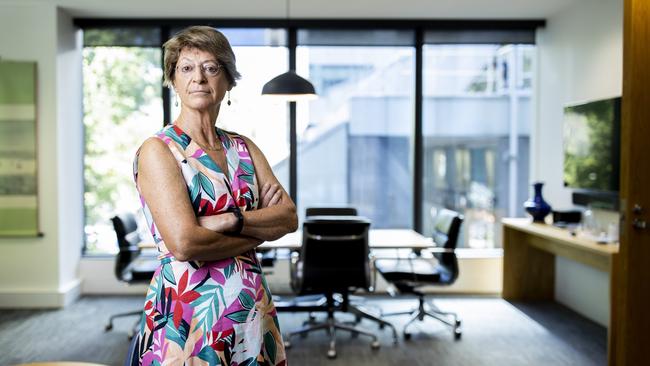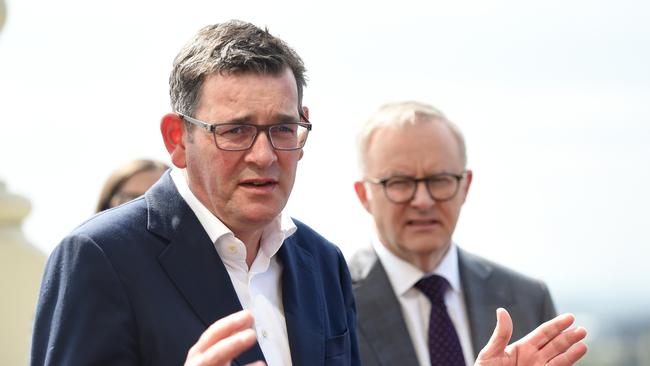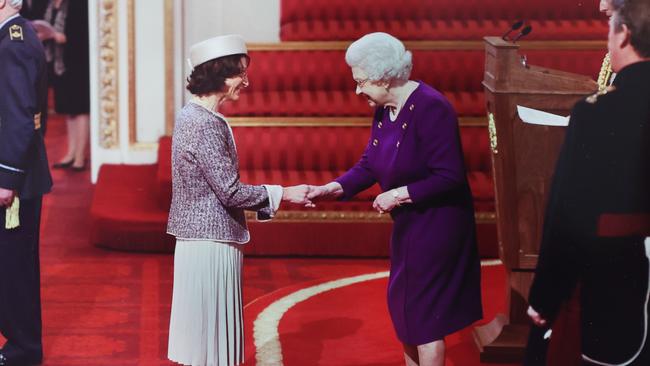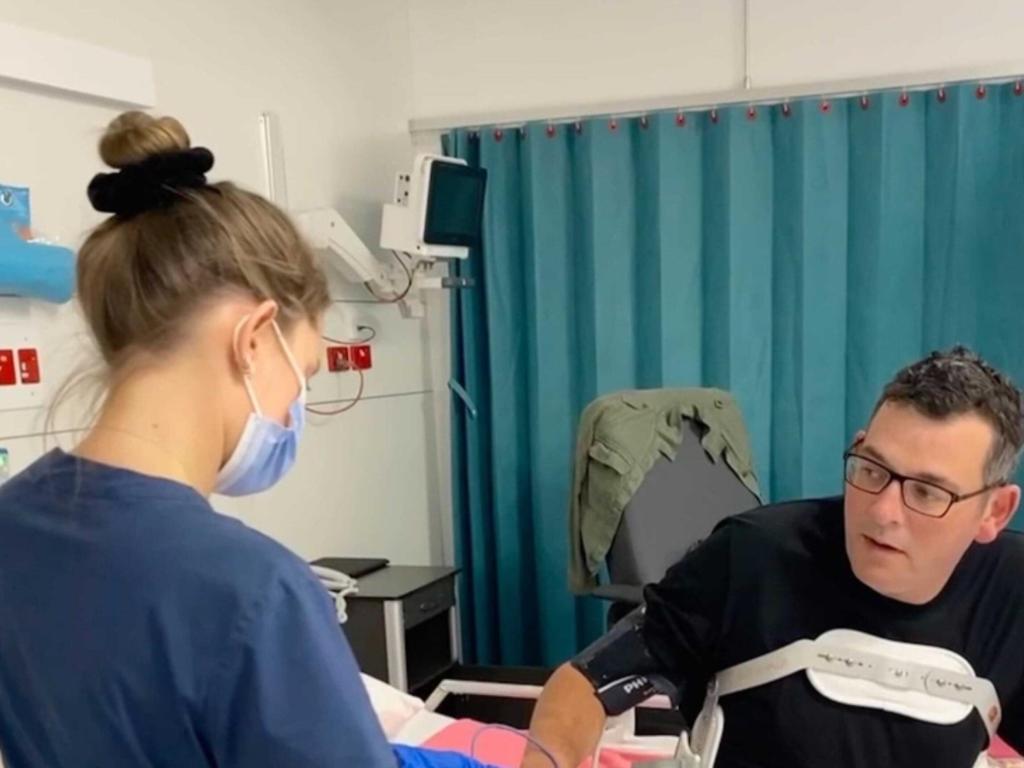Deborah Glass: The Ombudsman who held Daniel Andrews to account
Ask outgoing Victorian Ombudsman Deborah Glass what relationship she had with former premier Daniel Andrews and the answer is blunt.

It is no surprise the formidable Glass is not Andrews’ favourite person. Glass was the state’s Ombudsman during all of Andrews’ nine years as premier. In that time she has delivered a slew of devastating and bluntly worded reports calling into question the Andrews government’s behaviour on issues from the politicisation of the public service to election rorting, branch stacking and the hardline Covid-19 lockdowns.

The impact of Glass’s reports have been all the more powerful because they are written by an independent watchdog rather than someone with a political axe to grind. During an era of Labor dominance, where the Liberal opposition has been all but missing in action, Glass at times appeared to be the only person in Victoria holding Andrews and his government to account.
In a final interview before she leaves her role on March 29 after a decade in the job, Glass insists it’s not personal on her part. She points out that she also has investigated the state Liberal Party during her time in office and that many of the Labor-centric investigations were referred to her office from parliament. But the 64-year-old is not one to take a backward step and says she believes Andrews, who resigned in September last year, “misconceived” the role of independent watchdogs in holding governments to account for their behaviour.
“When you’re tasked with investigating the government of the day, yes, that is going to bring you into a certain amount of conflict whether you like it or not,” she says. Remarkably, she never met Andrews during his nine years as premier and spoke with him on the phone briefly only once.
Andrews made his hostility towards her office clear late last year when he said in a podcast that the state’s integrity officers were not entitled to “pretend that anyone voted for them. They’re not entitled to pretend that they’ve somehow got a mandate that is equal to, let alone superior to, the duly elected government.”
“There’s not an accountability officer who doesn’t want more money, more power. That’s fine, that’s their job,” Andrews said.
Glass says Andrews’ comments “fundamentally misconceived the role of integrity agencies”.
Glass has strengthened the power, independence and profile of her office since she became Victorian Ombudsman in 2014, in part by winning greater financial independence from the government that she often has to criticise.
Glass, who is Victoria’s first female Ombudsman and only the fifth in the role since established by the Hamer Liberal government in 1973, succeeded in separating her office from the Department of Premier and Cabinet, which previously determined its funding.
Even so, in the future she wants her $20m a year office to be “entirely removed” from the state government, with the Ombudsman’s annual budget set by an independent tribunal.
Part of Labor’s hostility towards Glass is the fact she was appointed by the Napthine Liberal government in 2014, only eight months before Andrews was elected premier. Glass was chosen largely because she was an outsider who had no political connections to either side of politics, but she did have an international track record of being willing to challenge authority.
“I don’t come from a political background and not even slightly, I have no political affiliation at all,” Glass says.
Glass, whose father was a doctor and her mother a dietitian, did a law degree at Melbourne’s Monash University before working with an investment banking firm in Switzerland and then in Hong Kong, where she became involved in financial regulation.
But what helped her to land the job as Ombudsman was the decade she spent in Britain investigating misconduct of police as the head of the Independent Police Complaints Commission.
In this role she launched the biggest criminal investigation into police misconduct in British history, when she ordered a probe into the behaviour of police during the 1989 Hillsborough disaster that killed 96 football fans in a crowd crush at an FA Cup semifinal.
It was a courageous decision that was heavily criticised by police groups but welcomed by the families of victims and eventually the investigation found police mismanagement played a key role in the tragedy. Queen Elizabeth II presented Glass with an Order of the British Empire for her work.

In Glass’s role as Ombudsman, which covers the administration of state departments, local councils and statutory authorities – including in response to public complaints and referrals from state parliament – Glass has focused on many non-political issues such as prisoner rehabilitation and residential services. But it is her political inquiries that have garnered most attention.
These included the so-called red shirts inquiry that began in 2015 and found 21 Labor MPs had misused their electoral staff budget entitlements for political purposes before the 2014 election.
This was followed in 2020 by Operation Watts, a joint investigation with the state’s corruption watchdog, the Independent Broad-based Anti-corruption Commission, over branch stacking and unethical behaviour by certain Labor members of parliament.
That report, in July 2022, found “rampant nepotism, (the) forging (of) signatures and attempts to interfere with government grants to favour factionally aligned community organisations”. It forced Andrews to apologise unreservedly for his party’s behaviour and to promise to implement all of its 21 recommendations.
Glass also took aim at the Andrews government over aspects of its handling of the Covid-19 pandemic, in which Victoria implemented the harshest and longest lockdowns in the country.
In particular, she was “incensed” that the Andrews government refused to apologise for locking down about 3000 people in nine public housing towers in inner Melbourne in July 2020 with no warning, a move she said violated their human rights.
She also accused the government of treating Victorians “inhumanely” in its hardline Covid border closures with NSW and said those Victorians who were affected should have been compensated.
In August 2022, Glass further angered the government by giving a speech in which she expressed concern about the premier’s “obsession” with eliminating Covid through lockdowns and its impact on “mental health, the young and the very old”.
“If there is one word I would use to describe my own criticism of the government’s pandemic response it would be nuance, or more appropriately lack of nuance,” she said.
Looking back, Glass says history has validated her concerns about the Andrews government’s hardline response to the pandemic.
“With the public housing towers (lockdown), it came across as a security response rather than a public health response and that to me was unforgivable,” she says.
“Here were these people, predominantly from non-white refugee backgrounds, who were the only people before or since locked down with no notice whatsoever and with uniformed police surrounding their homes.”
But Glass says her most difficult investigation was also the most damning – the inquiry into the politicisation of the state’s public service after nine years of a dominant Labor government. Her report, released in December last year, found a “culture of fear” and “creeping politicisation” among the 300,000-strong public service.
She found this culture of fear was stopping bureaucrats from giving frank and fearless advice to the government, eroding the traditional role of the public sector.
She also found examples of ministerial staff being appointed to positions without the jobs being advertised and hiring panels playing with selection criteria to choose certain people.
Her report also found a culture of excessive secrecy, an overuse of consultants and major decisions being made in “echo chambers” without opposing views or due debate. As an illustration of the political centralisation of power, she highlighted the huge size of the premier’s office, which in Andrews’ final year had roughly the same number of staff as the Prime Minister and NSW Premier combined.
“It would definitely be the hardest (investigation) because it was so complex, it was the equivalent of half a dozen major investigations running in parallel,” says Glass.
But the biggest obstacle was simply the deep-seated fear among public servants about speaking with the Ombudsman’s office about the issue. At one point, so many public servants were terrified of speaking that Glass wondered whether it would be possible to write the report.
“I didn’t expect the extent of the fear,” she says. “The process of trying to chase rabbits down holes and finding a lot of scared rabbits was very challenging.”
The question Glass kept asking was “where does the government get its advice because it’s not taking advice from its senior public servants”.
She zeroed in on the controversial $125bn yet-to-be-built Suburban Rail Loop project, which was hatched amid secrecy in the lead-up to the 2018 election by a single executive without the involvement of the state’s top transport bureaucrats. The concept, which was not properly costed, was then outsourced to consultants in an effort, according to Glass, to “prove up” the project.
“We know in the case of the Suburban Rail Loop that the head of the Department of Transport was kept completely in the dark over the development stage. We know that Infrastructure Victoria … was blindsided by it, so we know that they weren’t getting advice from traditional sources.
“So where was the advice coming from? Well, it’s coming from consultants. It’s coming from ministerial advisers, (and) this is when you get advice in echo chambers. You will hear people tell you what you want to hear.”
Glass is also scathing about the Andrews’ government’s botched proposal to host the 2026 Commonwealth Games, a fiasco that already has led to a compensation bill of $380m plus numerous other costs, adding to a record state debt that is heading to $171bn by mid-2027 – almost equivalent to one-quarter of the state’s economy. “History revealed major flaws in the assumptions underpinning the financial modelling for the Games,” Glass says.
She says such a culture of politicisation comes from the top down and she mentions how Andrews, in a podcast last year, cited an example of a top bureaucrat who advised him after the 2014 election not to scrap the East West Link tollway project even though that had been Labor’s policy platform during the campaign.
“We know from the public record that the person who gave (Andrews) that frank and fearless advice lost his job that day,” says Glass. “So what message is that going to send to the entire public service about giving frank and fearless advice? Don’t do it is the message that’s going to send.”
Glass accepts that this sort of culture does not change overnight, and she was disappointed with the response of current Premier Jacinta Allan to her politicisation report, where Allan played down the report’s findings as consisting of “inferences” and “speculation”.
But Glass has hounded the government at every turn during the past decade to implement the recommendations in her reports, and says it will now be up to her successor to keep the government accountable on the key issue of the politicisation of the public service.
Glass says she has enjoyed her decade heading the key oversight body in the state during such a turbulent time. “Integrity agencies are one of a number of mechanisms by which governments are held to account – others include the media, the opposition and the electorate – and we all have a role to play.”
But she says that while she is independent in her role, she is not neutral. “I’m not neutral about social justice and fairness, and these are at the core of the Ombudsman’s role. I think it’s important to make that point because otherwise you’re a kind of a bland umpire. And I’m not that.” Strong and direct language, she says, “is my style”.
“I don’t think I would have made a career in the diplomatic service because that’s how I have always been.”
So what comes next for her? “I think it’s really important when you take on a job like Ombudsman that you’ve got to see it as your last big job,” she says with a smile. “Because if you do your job well, you’re not likely to get another one.”





Ask outgoing Victorian Ombudsman Deborah Glass what relationship she had with former premier Daniel Andrews and the answer is blunt. “I would say it was none for pretty much his entire term,” she says. “But towards the end it was very clear that he was becoming increasingly prickly. And that played out publicly in comments he made … and in what you might call snide remarks.”